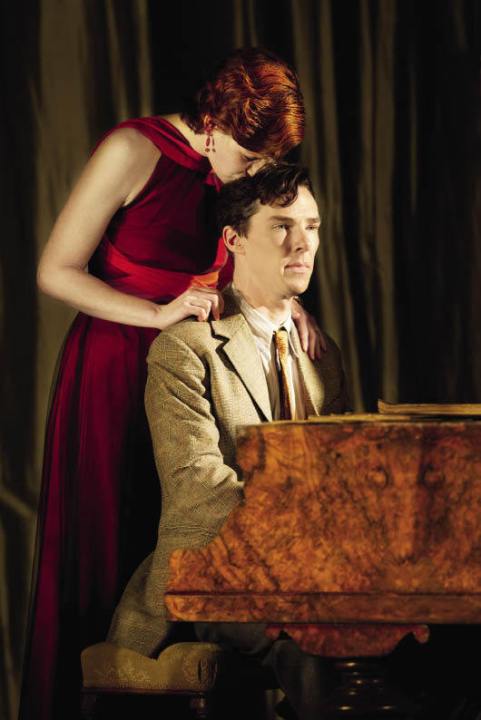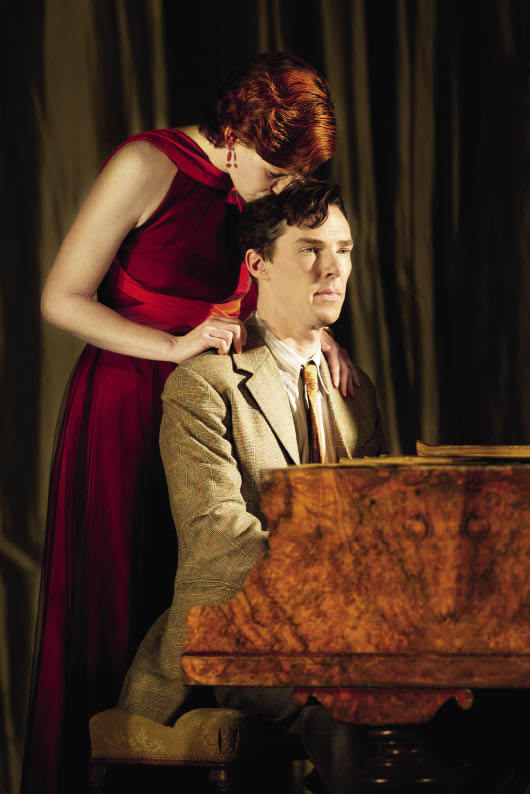Through a Glass Darkly
Almeida, until 31 July
After the Dance
Lyttelton, in rep until 11 August
Ingmar Bergman wrote his first film aged 24. It was called Torment and he continued to entertain audiences in similar vein for the rest of his career. That an artist is easy to satirise is no proof of inadequacy, of course. MC Hammer was easy to laugh at too, and look how brilliant he was. But Bergman is the most austere and humourless of dramatists. He was so dry the ink wouldn’t flow from his pen but spilled out in dusty granules.
Through a Glass Darkly, the only one of his films he permitted to be adapted for the stage, comes from the starchier end of the spectrum. It’s August. We’re on a remote archipelago where a family of high-minded Swedes are having a holiday from hell. Karin is recovering from a nervous collapse. Her father, a novelist, is planning a book tour of Yugoslavia, the only country in Europe that fully appreciates his work. His loquacious 16-year-old son is bursting at the seams to become a playwright and knocks out a new script every afternoon. But will dad read his work? Nope. The old sourboots deliberately ignores the hint-hint manuscripts which are placed every morning on the breakfast table beside the cold tea, burnt toast, stale cornflakes and rotten eggs. (I’m assuming, rather than reporting, that the breakfast ingredients are inedible but their putrescence would harmonise with Bergman’s world-view.)
Karin, meanwhile, is going more and more bonkers, just like her mother who, we are encouraged to deduce, killed herself. Her father confesses to his diary that his daughter’s breakdown will furnish excellent material for his next potboiler. When Karin reads this admission the consequences are, shall we say, some distance from being hilarious. The beautiful Ruth Wilson traces Karin’s mental implosion convincingly enough but the truth is that actors can’t visit asylums and watch mental breakdowns in progress so any replication of lunacy is inevitably a collection of highlights lifted from previous simulations. Jocasta, Ophelia, Lady Macbeth and Blanche Dubois are all diced up and whirled together in the Moulinex. The results are as impressive as a facsimile can be. Really, the fault lies with dramatists who insist that a character must fall apart and articulate the process at the same time. It’s like asking a driver to describe a car crash while he’s having it. The director, Michael Attenborough, has produced a faithful and perfectly satisfying version of Bergman’s film and the creator of Torment would be gratified indeed. For Bergman fans the show is unmissable.
Terence Rattigan’s little-known play After the Dance is the biggest surprise of the theatrical year. Bad luck dogged its birth. It opened in the summer of 1939 and closed weeks after the war began. Rattigan considered it a failure but as an emotional portrait of the doomed, thrill-hunting mania of the interwar years it has no rival. The central character, David, is a millionaire alcoholic who longs to establish himself as a historian and has spent five boozy years tinkering with a biography of a Neopolitan princeling no one has heard of. His marriage to Joan (Nancy Carroll, in exhilarating form) is an ever-present distraction. We watch the pair hurtling gaily towards their forties in a meaningless cycle of parties, pranks and gossip. Both are deeply in love but neither has admitted their feelings for fear of being thought ‘a bore’. Into this fragile terrain comes the prim and icily beautiful Helen (played with terrific assurance by Faye Castelow) who falls for David and tries to lure him away from his life of wasteful frolics.
Rattigan draws his characters with amazing boldness and freedom. David’s pals are as gruesome a bunch of show-offs and halfwits as you could hope to meet and yet each exposes to us just those facets of their nature that will make them human and sympathetic. The exception is a daredevil airwoman, Moya Lexington, who regularly flies her two-seater across the Poles. But instead of emphasising her courage Rattigan deliberately portrays her as a monster of superficiality. By contrast there’s a terrible old stiff who runs a window-cleaning business and who comes across as a model of decency and common sense. The most gratifying of these counterintuitive sketches is Adrian Scarborough’s John, who starts as a sponging court jester and develops by slow stealth into the moral conscience of the piece. Scarborough’s performance is a superb piece of artistry. He captures every chink and gleam of the man’s peculiarities, his acerbic frivolity, his calculating greed, his psychological intelligence and ultimately his steadfastness and candour. He’s counterbalanced by Benedict Cumberbatch who with some brilliance evokes David’s tortured and magnificent romanticism. Right now the London stage is luxuriating in a rare abundance of masterpieces. All My Sons and The Late Middle Classes comfortably qualify. So does this.








Comments